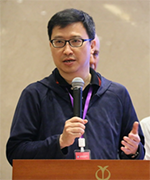10-12 January 2023, Nanjing (Hybrid)
10-12 January 2023, Nanjing (Hybrid)
KEYNOTE SPEAKERS

Talk: Smart Surfaces for NextG and Satellite mmWave and Ku-Band Wireless Networks
Kyle Jamieson
Professor, Princeton University
Abstract: To support faster and more efficient networks, mobile operators and service providers are bringing 5G millimeter wave (mmWave) networks indoors. However, due to their high directionality, mmWave links are extremely vulnerable to blockage by walls and obstacles. Meanwhile, the first low earth orbit satellite networks for internet service have recently been deployed and are growing in size, yet will face deployment challenges in many practical circumstances of interest. To address both such challenges, the Princeton Advanced Wireless Systems lab is exploiting advances in artificially-engineered metamaterials to enable steerable wireless mmWave and Ku band beam reflection and refraction. Our approaches fall under the category of Huygens metamaterials, but our advances enable practical electronic control and simultaneous use in multiple frequency bands in such materials, for the first time. We have specified our designs in RF simulators and prototyped in hardware, and our experimental evaluation demonstrates up to 20 dB SNR gains over environmental paths in an indoor office environment.
BIO: Kyle Jamieson is Professor of Computer Science and Associated Faculty in Electrical and Computer Engineering at Princeton University. His research focuses on mobile and wireless systems for sensing, localization, and communication, and on massively-parallel classical, quantum, and quantum-inspired computational structures for NextG wireless communications systems. He received the B.S. (Mathematics, Computer Science), M.Eng. (Computer Science and Engineering), and Ph.D. (Computer Science, 2008) degrees from the Massachusetts Institute of Technology. He then received a Starting Investigator fellowship from the European Research Council, a Google Faculty Research Award, and the ACM SIGMOBILE Early Career Award. He served as an Associate Editor of IEEE Transactions on Networking from 2018 to 2020. He is a Senior Member of the ACM and the IEEE.

Talk: Cooperative Stochastic Bandits with Asynchronous Agents and Constrained Feedback
John C.S. Lui
Choh-Ming Li Chair Professor, The Chinese University of Hong Kong
Abstract: In recent years, there is a growing interesting in designing efficient online learning algorithms, either in terms of multi-armed bandits or reinforcement learning approach. In this talk, we will give a brief background about multi-armed bandits (MABs), as well as the intuition on why it works and what core mathematical techniques we use. Then we will discuss the case wherein we have multiple heterogeneous learners who is willing to cooperate to solve the same instance of a K-armed stochastic bandit problem.
BIO: John C.S. Lui is current the Choh-Ming Li Chair Professor of the CSE Department at the Chinese University of Hong Kong. He is a fellow of ACM and IEEE, and a fellow in the Hong Kong Academy of Engineering Sciences. He is a senior research fellow at the Croucher Foundation. His recent research interests include quantum Internet, online learning algorithms and their applications, as well as stochastic performance evaluation theory.

Talk: TBD
Xinbing Wang
Distinguished Professor, Shanghai Jiao Tong University
Abstract: TBD
BIO: Dr. Xinbing Wang is a Professor of Shanghai Jiao Tong University. He is the Chairman of the ACM China Council, was the Vice Dean of the School of Electronic Information and Electrical Engineering, as well as the Executive Director of the John Hopcroft Center for Computer Science at Shanghai Jiao Tong University. He is leading the project of ACEMAP (www.acemap.info), an academic knowledge graph system with billion nodes. He has served on the editorial boards of several international journals, including IEEE Transactions on Information Theory, IEEE/ACM Transactions on Networking. He has supervised three Ph.D. students awarded as ACM China Doctoral Dissertation, Outstanding Doctoral Dissertation Award from Chinese Institute of Electronics (CIE) and Outstanding Doctoral Dissertation Award from Chinese Institute of Communications (CIC), and more than 40 graduated students working in various universities in China.

Talk: Parallel Intelligent processing of Ultrasonic Image and its Application
Kenli Li
Cheung Kong Professor, Hunan University
Abstract: At present, prenatal diagnosis and birth defect screening are mainly examined by ultrasonic section, which are highly dependent on the operator's level of experience, low efficiency and standardization, and backward section evaluation techniques, which lead to high misdiagnosis rate and missed diagnosis rate of fetal malformation screening. Aiming at the accuracy and real-time challenge of ultrasonic image AI automatic capture and quality control system, different depth learning models are proposed to improve the accuracy of standard section interpretation, and different parallel computing models such as pipelining and data parallelism and their communication optimization methods are adopted to improve the real-time performance of section capture. And the new mode of ultrasonic image interpretation and auxiliary diagnosis based on end, edge and cloud architecture, which is expected to improve the work efficiency of ultrasound doctors and alleviate the work intensity of doctors
BIO: Kenli Li, Vice President of Hunan University, CCF member. Head of the Innovation and Intelligence introduction Base of the Ministry of Education for High performance Computing, Director of the Engineering Research Center of the Ministry of Education for High performance Computing Application Software. Vice Chairman of the National Super Computing Innovation Alliance, member of the expert Committee of the New Generation artificial Intelligence Industry Technology Innovation Alliance, member of the overall expert Group of the National key Research and Development Program for High performance Computing, Chairman of CCF Changsha, Vice Chairman of Hunan computer Society, Deputy Editor of IEEE-TC/TSUSC/TII, editorial Board of computer Research and Development. He has presided over more than 30 national, provincial and ministerial projects, such as national key R & D programs and key projects of the Foundation Committee. Won the National Science and Technology Progress Award, Innovation team Award (ranking 13th) and other awards. The main research fields are parallel and distributed processing, supercomputing and cloud computing, high-performance computing for big data and artificial intelligence and so on.
News
-
Jul 9, 2022Title and abstract due -
Jul 16, 2022Paper submission due -
Jul 16, 2022
Title and abstract due
-
Jul 23, 2022
Paper submission due
-
Sep 24, 2022
Notification of acceptance
-
Nov. 11, 2022
Camera-ready deadline
-
Nov. 15, 2022
Early-bird registration deadline
Copyright © 2022 International Conference on Parallel and Distributed Systems, Nanjing
